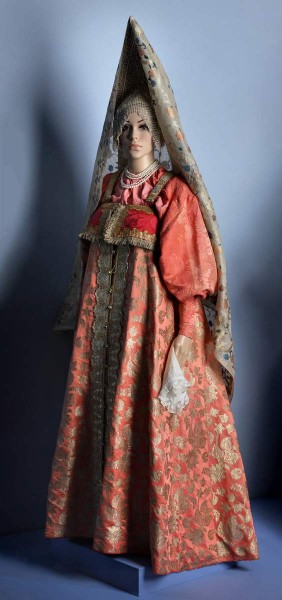Maiden’s Festive Costume
Galich, Kostroma Gubernia. Late 18th century
- Heavy silk, stitching, brocade, galloon, cardboard, chopped mother of pearl, foil, colored glass, stringing, silk, gold threads, weaving
- Тк-548, 549; Тк-1682; Гр.Б-1627; В-2859; В-6943; Тк-1218
Shirt (sleeves)
Silk
Sarafan
Brocade, galloon
Dushegreya
Brocade, galloon
Kokoshnik with Ochelye
Cardboard, chopped mother of pearl, galloon, foil, colored glass, brocade, printed cotton cloth
Veil
Silk, gold thread, weaving
The word “sarafan” comes from the Persian sarapa, literally meaning “clothed from head to foot” (Savvaitov 1896, 124). This word was applied to men’s clothing in Russia from the 14th to mid-17th centuries. Later the term sarafan came to be used only in regard to women’s clothing. Old-style sarafans had sleeves or simply large armholes. They were open-front, buttoning up to the neck. The sarafan’s trimmings — which include filigree buttons, passementerie and silk ribbons — make this article of clothing truly priceless. The back of an old-fashioned flared sarafan was of one piece with the straps; this angle in the back was known as a “frog”.

